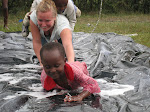Two weeks ago I attended the Traveler’s Philanthropy Conference www.travelersphilanthropy.org here in Arusha. The Centre on Ecotourism and Sustainable Development (CESD) www.ecotourismcesd.org hosted the three day event, in Arusha at the Ngurdoto Mountain Lodge. At the core of Travelers Philanthropy (TP) is the idea of “giving back” of time, talent and treasure to tourism destinations, with Arusha being the gateway to Mt. Kilimanjaro and the Northern Safari circuit in Tanzania, it provided an ideal venue! TP is slowly gaining ground as an important form of development assistance flowing from tourism businesses and travelers into projects that support local communities, our focus however, was on giving a hand up rather than a hand out.
There were two key note speakers:
Nobel Laureate Wangari Maathai, Ph.D.
Maathai founded Kenya’s Green Belt Movement http://www.greenbeltmovement.org planting over 40 million trees and becoming a leading force in Kenya’s pro-democracy struggles. In 2004, when Dr. Maathai was awarded the Nobel Peace Prize for her efforts, she became the first environmentalist and only African women to receive this prize!
David Western, Ph.D.
David Western is the former Director of the Kenya Wildlife Services (KWS), and founder of the East African Conservation Centre http://www.conservationafrica.org and founding President of The International Ecotourism Society (TIES). Western’s particular interest lies in pastoralism and community participation in conservation.
I attended a number of different workshops, from “the rights and wrongs of Philanthropy” to “Using the internet and media to promote and solicit donations”. What came up again and again was the need for community ownership, and the importance of the process of engaging with the community.
One company that stood out for me was The Intrepid Foundation www.theintrepidfoundation.org, which highlights the importance of income generating projects, to foster empowerment, and develop self-reliance. This I believe the first step towards TRADE NOT AID.
Wangari Maathai’s Key note speech was focused around the need for sustainable management of our limited resources, and the promotion of equity in the distribution of those resources through good governance. Very much tied into this is the culture of creating capacity and to what extent an organization can answer the question-has your project empowered a community? To what extent are we creating ownership? So that we can move from dependency to becoming a partner in development, where there is no sense of entitlement in the relationship.
For me one the most interesting workshop was about moving from Charity to Social Empowerment. The speaker that stood out for me here was Trisha Barnett from Tourism Concern, UK, http://www.tourismconcern.org.uk
who again highlighted the need for community empowerment, but not through Philanthropy or aid, but through trade, ethical tourism and enabling entrepreneurship.
I took a great deal from & Beyond (formerly CC Africa) http://www.ccafrica.com about the importance for working with communities and not for them. Accepting that respect takes time, relationships need to be nurtured.
How does all of this relate to TFFT and the valuable work that we do with orphans? I have a few ideas that I came up with from the conference:
Full Circle After school Program: Have the older children tell us what they think they need to learn , and what they would like to learn after school!
Developing an income generating project, that empowers our students and teaches them the basic principles of running ones own business.
Wednesday, December 17, 2008
Subscribe to:
Post Comments (Atom)






No comments:
Post a Comment